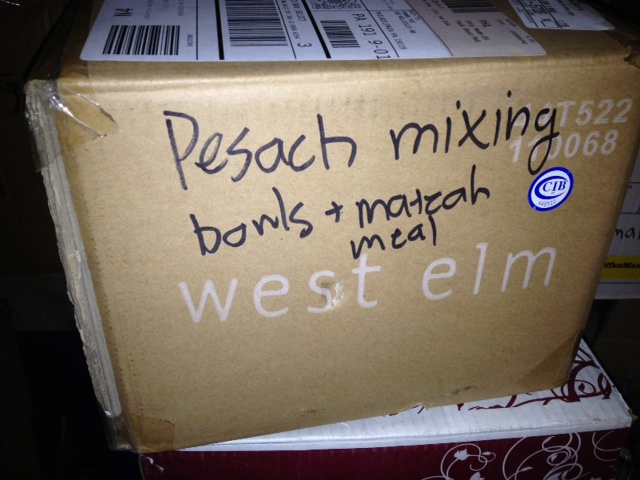Passover is (finally) over and that means that…it’s time to start preparing for next Passover.

Boxing up the Pesach supplies
Okay, now before you kill me for saying that, I just mean that now is the time to evaluate how your food prep held up this year, so you’ll be able to ensure that you’re better prepared next year.
As you’re putting away your Passover pots and pan, or simply throwing out half-used boxes of matzah farfel, here are some questions to jot down answers to. Email the answers to yourself, or put them in a google doc, and you’ll be able to plan next year with the full knowledge that came with this year’s celebration.
The Nosher celebrates the traditions and recipes that have brought Jews together for centuries. Donate today to keep The Nosher's stories and recipes accessible to all.
What was your shopping list this year? And what were your
menus?
This will help you get a baseline of what you were shopping for, and how much you got. If you happened to keep receipts and know how much you spent, that is also helpful to know (and I commend you for being way more organized than I was).
What did you have left over at the end of the holiday? This will help you gauge if you need to buy less of something next year. I also personally feel fine saving, say, an unopened box of matzah meal, for next year. My mother was notorious for saving spices over decades, which I don’t personally plan to do, but it’s an option.
What was the best thing you made or ate this Pesach? Perhaps it was an old classic, that you make and love every year, or maybe it was something new or recently tweaked. For me, it was this no-bake chocolate mousse cake made with avocado. It’s (vegan, even) and devastatingly delicious. I made it twice over Pesach, and the second time I added a teaspoon of cinnamon, which I highly recommend.
This brings me to What adaptations did you make to recipes, and how did they turn out? Besides the cinnamon to the cake, my friend Andrea and I did some major revamping of a stuffed onion recipe, and the results were fantastic. Thankfully, Andrea wrote up what she did after the seders and emailed it to me so that we can use it to go off of next year. I also remembered to write down that while making my aunt’s frozen mousse cake, there is a part where the batter starts to seize up, and while this is terrifying while it happens, it has no negative ramifications on the way the cake actually comes out.
What did you make that’s not worth making next year? Might as well cull the menu now, when you remember how disappointing that was.
What kitchen utensils, pots or pans would you like to have for next year? Since this was my first year making Passover by myself, I bought a whole set of dishes, pots, pans, and utensils. I was thrilled with everything, but wish I had thought to get a colander, a rubber spatula, and a few wooden spoons. I’ve already added them to my shopping lists for next year, and can be on the lookout for those items at sales.
What are some recipes that you didn’t get a chance to try, but would like to try for next year? Did you not get a chance to try everything on our communal seder menu? Collect recipes and links in one place so you know where to start looking next year.
With all that done, and your dishes packed away, you can leave Pesach behind―for about another 10 months, before next year’s Pesach frenzy begins.



